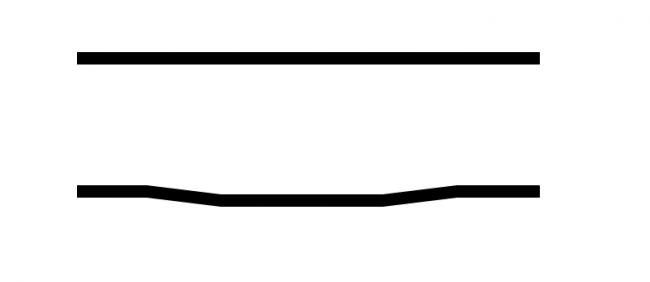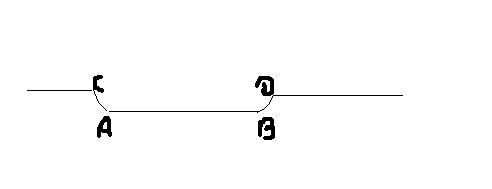now u may claim that velocity increase during AD ....but laila will need EXTRA time to go from C to A and den B to D .....so the time she gained in travelling faster from A to D is lost in going from C to A and den B to D
Laila has to cross a track of ice to reach the other side of the river to meet Majnu as soon as possible... :P
Now laila has 2 ways either to skid through the first track or the 2nd one..
The image shows the vertical section of the tracks
assume no friction..
Which track should she take?
(I know this is an often repeated question.. that I have rephrased :P)
Give a very simple solution..
-
UP 0 DOWN 0 0 24

24 Answers
Sankara.. try and draw the graph of velocity (along the x axis...) time graph
@ msp i wasnt right earlier ..but the pink one is right ,...and i m damn sure abt it
Vx=dx/dt Does it mean dat Vx increases implies that time consumed also less.
Say let we consider 2 paths for going from chennai to calcutta.
in path 1(300kms) the train can travel with an average velocity of 60Km/hr.time required is 5hrs
in path 2 (700kms) the train can travel with an average velocity of 70km/hr. time require is 7hrs.
arreyyyyyyyyy..i got the answer ... nishant sir u r right ..... 2nd path will take less time .... consider v as velocity in path 1
in path 2 , from A to B ...velocity is gr8er than v ...
now if we consider the slopes .........
for slope CA, the x component of velocity will be gr8er than v always ..due to acceleration .......[ accn is due to x- component of normal force on d slope ] .....now for slope BD , x component of velocity will keepon decreasing ....BUT it will always be gr8er than v at all times on the slope ....
hence ..as x -component of velocity is always gr8er than v in path B , time taken is les......
now nishant sir pls tell i m right or wrong !!
no one is arguing on that one.. velocity at c= velocity at d
so what you have to find is wheter the time taken in between is less or more? or equal ?
come on yaar ..only conservative forces exist ..so use KE + PE = const
so u will get Velocity at C = velocity at D
by saying that v = dx/dt = constant i mean that velocity at start point = velocity at end point ...actually i m nt able to frame it properly
i consider laila to be pushed at constant velocity at the start [ of course pushed ..she wont be able to walk ]
now in msp's fig, velocity at pt C =velocity at pt D....[ by conservation of mechanical energy ] so .... we can say that velocity doesnt change as we move frm C to D
i
but that is not enough.. because the path length in the 2nd path is higher...
path 2 sir.

in path 2 laila will travel the distance AB in shorter time as her velocity increases.